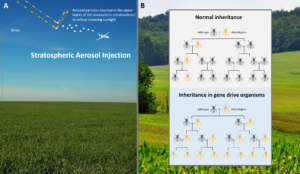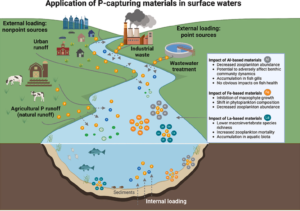Home
Interdisciplinary Risk Sciences
To solve our grand challenges in society, interdisciplinary solutions are urgently needed. New technological and management solutions will be needed to feed an estimated 10 billion people by 2050, secure safe and sustainable drinking water sources, as well as deal with the global climate crisis (1), among other examples. Scientists, researchers, industry, government, and other actors will naturally turn towards the development of new technological solutions and products of innovation to secure safe and sustainable futures. At the same time, new innovations and novel technologies can also present unknown risks as well as controversies in society. Well-known examples include first generation of genetically-modified organisms (2, 3) and nanotechnology (4), as well as geoengineering (5), new materials for environmental remediation (6), and even new vaccines (7).


To reduce risks and better align benefits with societal values, needs, and expectations, new approaches are urgently needed within science, technology, social sciences, and governance to strategically incorporate practices that foster innovation that is responsible and sustainable, in order to ultimately solve our grand challenges without creating additional challenges themselves. We should also reflect upon previous experiences with other emerging technology and risks to formulate best practices for understanding and governing risks for future emerging risks (see (4) and (8), for more details).
Therefore, Dr. Grieger’s Interdisciplinary Risk Sciences Research Group aims to develop innovative approaches within the field of risk science, in order to develop strategies to understand, manage, as well as communicate complex environmental health risks in a post-2020 world. Because after all: “We cannot solve our problems with the same mindset we used when we created them” – Albert Einstein
Additional Information and Resources
- Department of Applied Ecology
- NC State Extension
- Genetic Engineering and Society Center
- Science and Technologies for Phosphorus Sustainability
- North Carolina State University
References
- Grieger, K. & Kuiken, T. 2019. Lessons Learned for Risk Governance of Synthetic Biology, Nanomaterials, and Other Emerging Technologies in a Post-2020 World
- Kuiken, T., Barrangou, R., Grieger, K. 2021 “(Broken) Promises of Sustainable Food and Ag through New Biotechnologies: The CRISPR Case. The CRISPR Journal, 4(1): 25-31
- Kuzma, J., Grieger, K. 2020. Community-Led Governance for Gene-Edited Crops. Science, 370(6519): 916-9182020
- Grieger, K., Jones, J.L., Hansen, S.F., Hendren, C.O., Jensen, K.A., Kuzma, J., Baun, A. 2019. What are the Key Best Practices from Nanomaterial Risk Analysis That May Be Relevant for Other Emerging Technologies? Nature Nanotechnology, 14, 998–1001
- Grieger, K., Felgenhauer, T., Renn, O., Wiener, J., Borsuk. 2019. Emerging Risk Governance for Stratospheric Aerosol Injection as a Climate Management Technology. Environmental System and Decisions, 39(4), 371-382
- Zhi, Y., Zhang, C., Hjorth, R., Baun, A., Duckworth, O., Call, D., Knappe, D., Jones, J., Grieger, K. Emerging Lanthanum (III)-containing Materials for Phosphate Removal from Water: A Review towards Future Developments. Environment International, 145: 106115
- Kuzma, J., Grieger, K., Cummings, C.L., Brown, Z. S. 2020. Pandemics Call for Systems Approaches to Research and Funding. Issues in Science and Technology, May 4, 20200
- Grieger, K.D. 2019. Behind the Paper: Best Practices from Nano-Risk Analysis Relevant for Other Emerging Technologies. Nature Nanotechnology, November 7, 2019. https://devicematerialscommunity.nature.com/posts/55315-best-practices-from-nano-risk-analysis-relevant-for-other-emerging-technologies
Contact:
Khara Grieger; Assistant Professor, Department of Applied Ecology, NC State
